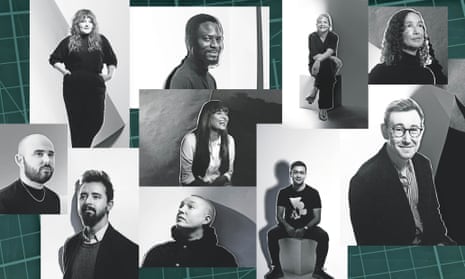For the 10th year running, here’s the Observer New Review’s annual pick of debut novels we reckon you won’t want to miss. No one could accuse us of failing to read the runes last time out, when our selection included Bonnie Garmus’s gazillion-selling Lessons in Chemistry, Louise Kennedy’s Trespasses – the title most frequently cited as the best book of 2022, according to industry magazine The Bookseller – and Sheena Patel’s I’m a Fan, another favourite, proclaimed “book of the summer” by the Evening Standard and “the summer’s slow-burning must-read” by the Sunday Times.
Far be it from us to say you saw it here first. Patel, who signed with the tiny indie press Rough Trade Books when “no one else was listening”, now says: “I was coming from so far outside the publishing world; the industry felt very remote and extremely closed. No one knew about I’m a Fan, which was basically DIY; that list, which everyone pays attention to, legitimised a book that didn’t have the machine behind it.”
That’s one job of lists like this, and it’s part of why we spend every autumn hawk-eyed over publishing schedules and trade announcements, buried in bind-up copies and PDFs in our quest for literary gold. But the only thing that ever counts is what is on the page: outsider or insider, if we think you’re bringing out a great first novel (and you’re in the UK or Ireland), a place on the list is yours. The class of 2023 includes a writer on an Emmy-winning Netflix show and a book publicist with a 20-year career at the heart of the trade.
We’ve ushered nearly 80 authors into the spotlight since 2014, from Sally Rooney to Douglas Stuart – one of only 20 men ever to have made the cut, incidentally. (We’ve got five more men this year – for anyone wondering “where are the new male hotshot novelists?”, as one newspaper asked a couple of years ago, you can call off the search.) In 2017 we questioned the scarcity of eligible black and minority ethnic writers; that’s changed, yet you may still wish to consider – as one of our current picks does – whether class limits opportunity (it would hardly be a shock if it did, given a recent Glasgow University study found that median author income has sunk to £7,000).
But while arguments can and should rage, let’s toast the craft and graft of another 10 outstanding new writers whose subjects and styles are as diverse as their paths into print, which happen to involve Stormzy in one case and the renowned London Review of Books editor Mary-Kay Wilmers in another. From the turmoil of same-sex desire in Victorian England to the funny side of getting divorced in your 20s; from the trials of manhood in recession-hit Belfast to a genre-bending coming-of-age saga from Nigeria by way of Norwich: all are among the sundry riches to be found here. Whether historical or autobiographical, intimate or epic, comic or tragic or all of the above – not least in the case of one frankly uncategorisable novel about nothing less than the end of the world – here’s to yet another year of excellent reading. Anthony Cummins
Stephen Buoro
The Five Sorrowful Mysteries of Andy Africa (Bloomsbury, 13 April)
We are going through a very difficult time in Nigerian history. Everything is crumbling
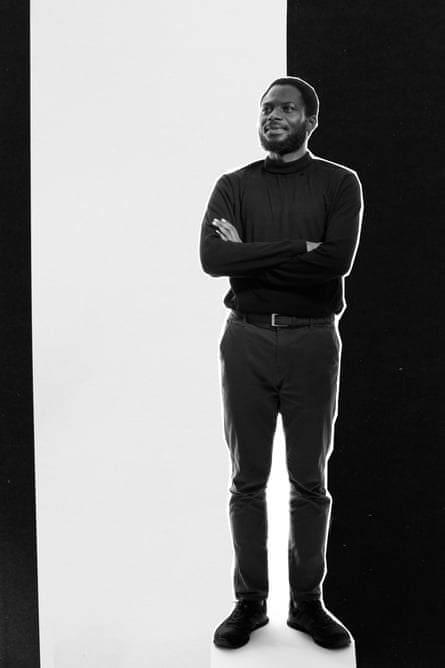
Stephen Buoro, 29, was born in Ososo, Nigeria, the fourth of six children. His father was a photographer, so their home was an artistic one, though the only books were religious texts. It wasn’t until Buoro won a scholarship to a missionary school, where children were caned for speaking any language other than English, that he learned to read. After earning a maths degree, he came to the UK to join the UEA’s creative writing MA as the recipient of the Booker prize foundation scholarship.
One evening in June 2018, just as it was getting dark, a voice came to him. “It wanted to confess all this internalised rage and angst. I started writing, writing, writing, and when I went back and read what I’d written, it was the most truthful, powerful thing I’d ever written in my life.”
Typed into his phone, it became the opening of The Five Sorrowful Mysteries of Andy Africa, an exhilarating, tragicomic novel that questions what it means to come of age in Nigeria today; a place where western culture abounds but opportunity is scarce. It’s narrated by Andy himself, a fatherless 15-year-old with a thing for blondes and a voice unlike any other.
When did you first start writing?
In 2005, the summer after my father died. I couldn’t even cry – writing was a way of bringing all those feelings out and examining them.
What did you write about?
A war in the animal kingdom. I showed it to a schoolfriend and he couldn’t believe that I wrote it. I think in some ways, all the writing I’ve done afterwards is a form of proof that I could do this.
Where did Andy come from?
From my community, from the conversations I’d have with my friends. He’s just this chimera, this device for looking at the African self and how the African and western selves interact. He uses maths, poetry, religion to confront his experience.
Were you influenced by any other teen narrators in literature?
I remember reading The Catcher in the Rye. I was at university and I was like, “Wow, so you can write a book like this. You can be so irreverent, so much more free and colloquial and still tell the story and explore these very important issues.” Salinger really unlocked that for me.
How much of Andy’s exasperation do you share?
We are going through a very difficult time in Nigerian history. It’s just so sad, everything is crumbling. For a writer, it’s wonderful because you have something to write about, but you wish you weren’t writing about these things.
You’re currently studying for a PhD in creative-critical writing. Has that changed how you go about your fiction?
I’ve learned a lot about theory, but when I go to my room I just want to tell a story.
What’s the best thing about being a writer?
Writing, of course.
And the worst?
It’s a vocation, so there are difficult days when the magic isn’t coming.
Do you still write on your phone?
Yes, when I want it to be more immediate. Phones are our most personal objects – they are with us everywhere. When I pick mine up the crazy editors in my head all calm down. It’s interesting thinking how Shakespeare would react to all these technologies.
Interview by Hephzibah Anderson
Tom Crewe
The New Life (Chatto & Windus, 12 January)
I was desperate to get this book out of my head
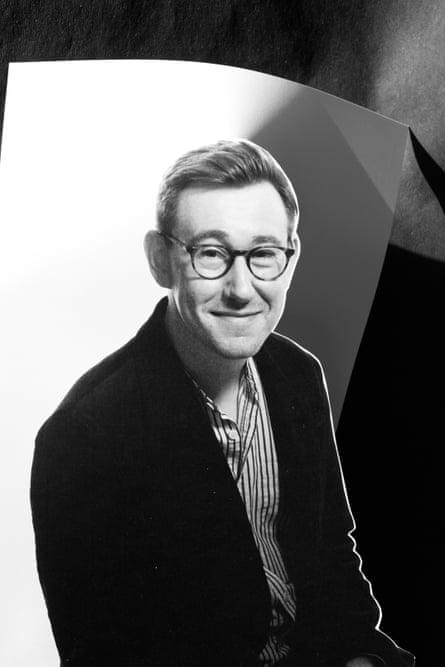
Tom Crewe recalls the “pressure cooker feeling” he had in the buildup to getting his boldly brilliant debut finished. He had the idea a decade ago, it was four years in the writing – around his job at the London Review of Books (LRB) – and he says he was “just desperate to get it out of my head… I felt like it was so much to be carrying around all day long.” Reaction to the book has also been strong, with Anne Enright declaring it “electrifying”.
The New Life is based, in part, on real people and revolves around a group of radical free thinkers in Victorian England who wish to live and love as they choose, without fear or shame. John Addington is married to Catherine, but falls for Frank, a working-class printer, while Henry Ellis’s wife desires women. Addington and Ellis decide to write a book together; a revolutionary text that will challenge convention and the law.
Crewe, 33, was born in Middlesbrough and studied history at Cambridge University, where he also did his PhD. His speciality is the 1880s and 1890s.
Where did the idea come from?
I was reading a biography of Oscar Wilde and came across John Addington Symonds. I was amazed that I didn’t know his name and I started trying to consider how one could write [a novel] about gay experiences in the late 19th century without Wilde. I do think that his story is such an omnipresent one and defines our whole sense of that period for gay men, and I was just delighted to discover this gay man who was making far more modern arguments than prevailed in the 1960s.
Symonds was writing a book before he died with [a man called] Ellis. He was a gay man married to a straight woman, Ellis was a straight man married to a gay woman and I just suddenly saw that symmetry and mirroring of the two marriages. I thought: “That’s my novel.”
The book opens with a strikingly sensual experience…
It was an experiment, really, inspired by a story one of my best friends had told me. He had been at a gig and someone was sort of pressing up behind him, and it was so crowded he couldn’t turn around, he couldn’t see who it was and he just thought it was wonderfully sexy. I was so struck by his story and thought: “What if I just try to stretch that moment out as long as possible – be bold.” I am wary of invoking the name of Alan Hollinghurst, which I’m sure is going to follow me around, but I think he offers a model of candour and a sort of a willingness to describe, to show, and I’m sure it liberates his successors.
How did it come to be published?
I wrote a piece on local government for the LRB [Crewe worked as an intern for former Labour government minister Margaret Hodge for six months] – it got a lot of attention and an agent wrote to me out of the blue.
Did you always want to be a writer?
I have school exercise books from when I was six that say: “When I grow up I want to be an author.” I knew that was what I was going to do with my life.
Which books and authors do you admire?
Well, you’re going to show me up to be a very bad literary citizen because I hardly ever read any new fiction. I have just been on a huge binge of the writer Margaret Oliphant, who I am evangelical about because I think she is the most underappreciated Victorian novelist there is.
Interview by Ursula Kenny
Jacqueline Crooks
Fire Rush (Jonathan Cape, 2 March)
This has taken me 16 years to write

Jacqueline Crooks is 59 and was born in Jamaica but grew up in Southall, west London. Her first novel, Fire Rush, began life as entries in her diary and is essentially a fictional portrait of her early years. “It’s very much based on my experience of being a young woman in a male-dominated world. Experiencing oppression. Dancing with wonderful people. The dark side and the light side as well.”
The book – a bustling and lively story of black womanhood and dub music in the late 1970s – follows Yamaye and her friends as they frequent an underground club, the Crypt. There, she meets and falls in love with the charming Moose, but things quickly unravel. Yamaye then embarks on a life-changing journey across London, Bristol and Jamaica as she gets swept up in race riots, violence, revolution and retribution.
Although Fire Rush is her debut, Crooks has already published a short story collection, The Ice Migration, which was longlisted for the 2019 Orwell prize in the political fiction category. One of her tales, Silver Fish in the Midnight Sea, was shortlisted for the BBC national short story award the same year. Writing Fire Rush was more of a challenge than The Ice Migration, she admits. “I’m a very fast writer. When writing a novel, you have to slow down a lot. But I’m on novel number two now, so I understand the process a lot better.”
How long have you been working on Fire Rush?
This has taken me 16 years to write. It has gone through many transformations. Lots of edits and different workshops. I had to do the subject matter justice. It’s about black women, rage, oppression, sound revolution and police violence. I had to do a lot of research.
What were the early responses to the book?
I sent the first chapter out years ago to lots of publishers and agents. No one was interested, except for Bernardine Evaristo and Maggie Gee, who were editing Granta’s Anthology of New Writing: Volume 15. They published the first chapter. Then an agent approached me and I thought: This is it. It’s going to get published. But the agent dropped me because she wanted me to write less patois. It was the best thing that could have happened, because now I could write the book the way I wanted to. So I put more patois in it.
What musicians did you listen to during the writing process?
Lee “Scratch” Perry, Gregory Isaacs, Dennis Brown, Coxsone sound system.
What are some of your favourite books?
Marlon James’s A Brief History of Seven Killings; The Water Dancer by Ta-Nehisi Coates; Colson Whitehead’s The Underground Railroad. I really enjoy Jacob Ross, Olive Senior and Leone Ross’s short stories.
What advice do you have for writers on finding their voice?
If you’re writing a book like this, which is really embedded in a culture, you’ve got to trust yourself. Trust the editors on structure, but when it comes to the voice, and the cultural nuance, you’ve got to be brave.
Interview by Kadish Morris
Aidan Cottrell-Boyce
The End of Nightwork (Granta, 5 January)
The desire to be good all the time can be a destructive thing
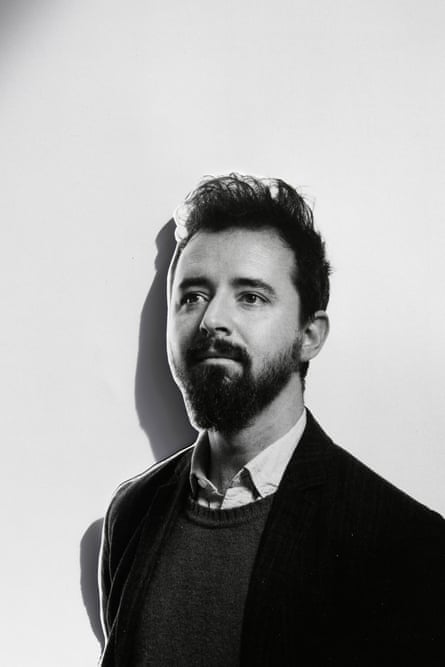
“It isn’t as depressing as it sounds!” says Aidan Cottrell-Boyce, 35, with a laugh, explaining why a devastating lockdown break-up led him to write The End of Nightwork, a debut novel about nothing less than apocalypse.
“When you’re going through a hard time, there’s that narcissistic feeling: how can everybody else not see that this is a catastrophe? How is everybody else just getting on with their daily lives? But that’s the experience of ‘apocalypse’ that we’re all having right now,” he says. “Everybody kind of knows the world is ending but most people aren’t engaged in strident climate denial or Extinction Rebellion. Most people think, ‘We’ll probably be incinerated soon, but I dunno.’”
Sold in a three-way auction, the novel grew out of the “30,000 words of madness” he sent an agent who saw his short fiction in the avant garde quarterly the White Review and asked what else he was writing after they played football together. Coupling labyrinthine intricacy with crystalline economy, the story involves a global youth revolt, a 17th-century prophet of doom and a rare hormonal syndrome that prematurely ages its victims; inventions all slyly sewn into a snapshot of pre-Brexit London as seen by a new dad in a faltering marriage.
Cottrell-Boyce is a Cambridge-educated theologian who once stood for the Green party and works as an academic in his day job. While he knows The End of Nightwork is likely to be seen as a novel of ideas, for him it’s viscerally personal. “I hadn’t read that many books about relationships of care and love and intimacy between two people ruining each other through that care. The desire to be good all the time can be a destructive thing.”
Your father is the celebrated screenwriter and novelist Frank Cottrell-Boyce. Did that help or hinder your writing?
It was helpful in some ways and difficult to live up to in others. It’s complicated. For his generation of working-class lads who went to grammar school, social capital was linked to their being very clever and that’s definitely a big part of my experience of our relationship.
What inspired the subplot about leftwing radicals?
I’m on board with a lot of what they’re saying; I didn’t want the reader to feel they were cranks. The narrator’s intrigued by their views but he’s banished from them – I wanted to capture the sense I’ve sometimes had of feeling excluded from causes like that. Having empathy is one thing but there’s a gift of righteous anger that comes from being brutalised by your political enemies. If you’re middle class, white and male, it’s just not available to you.
Why did you give George Saunders a cameo in the novel?
There’s a slightly S&M feeling to writing in academia, where the premium on accuracy is just so high. Maybe it was a rebellion against that: I was like, am I allowed to do this?! And I thought, yeah, why not? His work means so much to me. One of the things he does really well is make you feel sorry for everybody. Everybody’s struggling, everybody’s messing everybody else up and punishing each other all the time. It’s part of being human. AC
Jyoti Patel
The Things That We Lost (Merky Books, 12 January)
There were a lot of tears, disbelief and a great deal of quiet pride

Jyoti Patel’s first novel was a prize winner not only before it was published but also before it was fully written. The Things That We Lost won the Merky Books (the imprint created by Stormzy) New Writers’ prize in 2021 on the strength of its first chapter. Patel, 30, was working in digital marketing when she submitted her work for the prize, which awards a publishing contract to an unpublished writer from an under-represented background, aged 16-30. “There were a lot of tears, disbelief and a great deal of quiet pride. I really had to fight hard to study English at university,” says Patel, who found out she had won the prize during the pandemic. “I celebrated in lots of groups of six.”
Born in Paris to British Indian parents and raised in north-west London, she wrote the book because she grew up never seeing a story about a British Gujarati family living in London. It was a stop-start process: she wrote a rough draft in 2018, left it for six months, did a master’s in creative writing at the University of East Anglia, looked at the draft again and then paused for another six months. “Even [when I wasn’t writing], the characters were living with me. Once in a while, I’d think, ‘I wonder what they’re up to today.’”
At the centre of The Things That We Lost – a delicate and empathetic debut - is Nik, an 18-year-old who is struggling to navigate university life in a rural town, and his mother, Avani, who has long been grieving the tragic death of her husband, Elliot. When Nik’s grandfather dies, he is left a key that unlocks uncomfortable secrets about his father’s life and his family’s shame. The novel also jumps back in time to the 1980s and explores Avani and Elliot’s relationship and their experiences as a couple from Indian and white British backgrounds respectively. Essentially it’s a story about family secrets, love, belonging, diaspora and the way that immigrants perform their dual identity.
How did it feel to win the Merky prize?
When I was longlisted, I spoke to the commissioning editor at Merky and she said: “This is good. Keep writing.” That one conversation gave me so much faith in myself. It was the first time that a gatekeeper in the publishing industry, from a minority background, read my work and truly understood what I was trying to do. It’s really easy to be performative and to have a little scheme here and there, but Merky lives and breathes this idea of bringing different voices and untold stories to the mainstream. It feels so special to come into the world with my debut with them.
What is your writing routine?
I can’t write in the mornings. During the day, I collect lots of energy and thoughts and [by] the evening I know what I want to write. My whole day is a warm-up act.
What are some of your favourite debuts?
Ocean Vuong’s On Earth We’re Briefly Gorgeous, Shuggie Bain by Douglas Stuart and Open Water by Caleb Azumah Nelson. We’ve got a poet, a designer and a photographer. I always find that when you are a successful artist in another form, the pressure is off and that frees the writer to really bring their authentic self to the page. To not overthink or overcook. KM
Michael Magee
Close to Home (Hamish Hamilton, 6 April)
Most books from Belfast are by people who aren’t working class
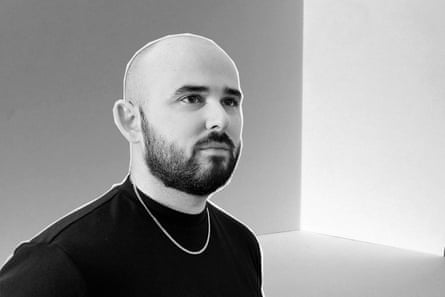
Michael Magee, 33, always knew he wanted to write about his native west Belfast, yet found himself inhibited by a “weird idea of what a novel had to be about – it wasn’t west Belfast, you know? Most books from Belfast are by people who aren’t working class; to them, west Belfast is a ghetto, a no-go zone. But the history of this place is the only history I know.”
That understanding paved the way for Close to Home, a poignant exploration of masculinity amid the latterday wreckage of the Troubles. The narrator, Sean, is the first in his family to go to university, only to graduate in a post-crash wasteland shorn of prospects; assaulting someone at a party doesn’t help.
Magee couldn’t find a way into his partly autobiographical material until a whiskey-fuelled heart to heart with the author Thomas Morris, who was then editing the influential Dublin literary magazine the Stinging Fly. Morris suggested Magee write him a letter “starting off at any point in my life and go from there”. After two weeks, the letter was 20,000 words long; after three months, Magee had the germ of Close to Home.
Further inspiration came from studying French authors Édouard Louis and Annie Ernaux, whose autobiographical writing on class pointed a way forward and fuelled Magee’s scepticism about the social mobility implicit in literary success. “What part of yourself are you losing in that process?” he says. “What does it do to your relationships? And how do you reconcile these things with the books you’ll write?”
One way, he reckons, is to go back in time, not forward; his next novel will be about boyhood and the one after that will follow a single woman raising two children during the Troubles, as his mother did.
“That’s kind of where I’m at, because this place is obsessed with the past,” Magee says. “People born either side of the Good Friday agreement, like Sean, were promised they’d reap the spoils of peace. But the working-class people who were disproportionately affected by the conflict still have incredible levels of poverty. People look around and think, well, what was it all about? We’re still poor as fuck.”
Do you think literary fiction is too middle class?
I don’t think – I know! I’m not pissing on anybody else’s success; there are a lot of really good novelists, regardless of background, whose work I really admire. But I think it’s valid to observe a lack of voices from working-class backgrounds, regardless of ethnicity or gender.
Can small magazines help?
They create communities and build relationships; when a Stinging Fly launch happens, everyone descends on Dublin from all over. Tom was particularly instrumental. Around 2014, he put me and Nicole Flattery, Sally Rooney and John Patrick McHugh in a group and said “away you go”. We were learning from one another in all sorts of ways.
How did your family react to Close to Home?
Without sounding a bit of a dickhead, I think they felt it was cathartic. The stories of people in this place have been overlooked or suppressed for so long; you see it now with legislation being put through to suppress appeals by families who suffered losses during the Troubles because of British state violence. It’s important to articulate the experience of what living here was and is. AC
Monica Heisey
Really Good, Actually (Fourth Estate, 17 January)
I’m very drawn to the kind of witty repartee you get in good romcoms
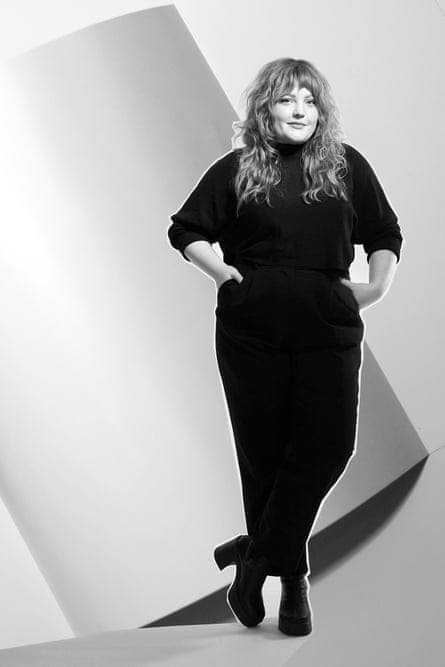
Marian Keyes, Rob Delaney, Nina Stibbe, Paula Hawkins, Dolly Alderton, Aisling Bea: these are some of the names queueing up to praise Monica Heisey’s painfully funny first novel, Really Good, Actually. Naturally, she is pinching herself. “It’s way beyond what I could have hoped for, to be supported by writers I have admired for so long – I just feel lucky that they read it in the first place,” she says.
Set in the author’s native Toronto, the book documents the fallout from a young couple’s divorce during the year between narrator Maggie’s 29th and 30th birthdays. This sounds bleak, yet it is anything but. In hilarious detail – including Google search histories, unanswered emails, “selected Tinder correspondence” and fantasy scenarios – she chronicles the messy process of becoming a “reverse Havisham”, from compulsive internet shopping to late-night Pot Noodle binges. “I wanted to depict the absurdity in the heartbreak,” says Heisey.
When her own marriage fell apart in her late 20s, she struggled to find an accurate reflection of her predicament in books and films: “I was looking to read or watch something that acknowledges it feels like the end of the world but it’s actually not; it’s bad but it’s going to be better. There was nothing out there, so I decided to write it myself.”
Now 34, Heisey first moved to London in 2010 for an MA in early modern literature at King’s College, supporting her first steps into writing and comedy by bartending for Secret Cinema. Visa problems sent her back to Toronto, where a spoof newspaper advice column, I Can’t Believe It’s Not Better, became a book. This launched her screenwriting career on shows such as Schitt’s Creek. She also got married, “instantly” got divorced and gravitated back to the UK.
Today she is a fully fledged Londoner and full-time writer, midway through her second novel. She is also filming a romantic-comedy series for Sky and is about to begin adapting Really Good, Actually for television.
Did being a screenwriter influence the way you wrote your novel?
I think it maybe helped keep the dialogue tight. I’m very drawn to the kind of witty repartee you get in good romcoms. I’m a big Richard Curtis fan and I adore Nora Ephron. I watch When Harry Met Sally basically monthly. It’s like part of my menstrual cycle.
Was writing Really Good, Actually therapeutic?
It wasn’t just therapy. I started writing it at the beginning of 2020 and my actual divorce was in 2017, so I’d had three years to figure out what I felt about it, what I wanted to say about the experience and to think about ways to fictionalise it and get creative with it.
How much of Maggie is you?
I would say Maggie is her own person, and I think I have the same kind of relationship to her as a creator that I hope the reader will have. Sometimes I’m a bit like, Girl, what are you doing? Other times, I’m like, Oh, I get it.
How important was it to explore female friendships in the book?
It was a big thing for me because for every messy person like Maggie out there, there are four or five friends running themselves ragged to support her. During my own divorce I felt so lucky to have the friend group that I had. And it was really important to me to acknowledge that people don’t just have these breakdowns on their own. They have real knock-on effects in their community and in their lives. And if you’re really lucky, you have people there to help you pick up the pieces.
Interview by Lisa O’Kelly
Georgina Moore
The Garnett Girls (HQ/HarperCollins, 16 February)
I was living vicariously through all those negronis
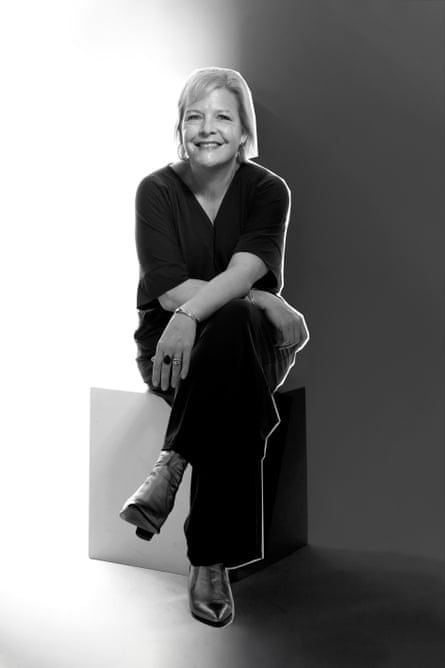
Books publicist Georgina Moore, 50, has worked with some of the biggest names in the business, including Adele Parks, Maggie O’Farrell and Patrick Gale. Books are in her heritage – her father ran a small academic publishing business and would take her along to the London Book Fair as a child. But her insider’s view of the industry as an adult, what it requires of authors and how hard they have to work to promote their books, put her off trying to write her own.
Then she spotted the perfect setting for a novel: a rambling beach house on the Isle of Wight, near where she and her partner keep a houseboat. The result is a character-led family saga about a journalist, Margo Garnett, her three thirtysomething daughters, their absent, alcoholic father and a home that draws them back no matter how far they run. The Garnett’s Isle of Wight is more Hamptons than bucket and spade and with Moore’s evocative prose it’s easy to see why The Garnett Girls is being likened to works by commercial fiction queens Penny Vincenzi and Maeve Binchy.
Moore and her family’s main home is a houseboat in London. She celebrated selling her book by buying Betsy, a little canal boat, to moor alongside, where she is now writing her second novel. “What’s so great about it is my family really think twice about interrupting me,” she says.
What was the impetus for writing The Garnett Girls?
Lockdown. It was full on having everyone at home and so I started getting up at about 5am to write. The book became this happy place where I was doing something for myself, creating a world I could escape into.
There are some pretty epic parties in the novel.
We weren’t going anywhere, and I couldn’t get to the Isle of Wight, so I was living vicariously through all those negronis. There’s a lot of longing in there and I think you feel that.
Who was your first reader?
My partner. He’s a psychotherapist and he was really helpful in talking to me about what it meant for these girls not to have a father. He’s not an overpraiser and he doesn’t read commercial fiction – he’ll reread Heart of Darkness on holiday – but he said: “I think you’ve got something here.”
The novel veers thrillingly close to domestic noir at one point.
People have been surprised. It is escapist because of the setting but it’s not sentimental and it is quite hard-hitting.
Your matriarch, Margo, is wonderfully flawed.
It was really important to me that Margo be vibrant and sexy and still getting into chaos. A lot of commercial fiction portrays older women as sitting in the corner wearing a cardigan. I wanted someone who was definitely not in the corner. In my heart and spirit, I feel very much a thirtysomething, but I’m closer to Margo than the girls in age.
How do you feel about “commercial fiction” as a label?
I’m not snobby about that – I want as many people to read my book as possible.
What’s the most important lesson you’ve learned from working with other authors?
Do the work, whether it’s an interview like this or a small podcast, because sometimes niche PR is really important. Support other authors and remember that it’s all about the readers. HA
K Patrick
Mrs S (Fourth Estate, 8 June)
I just had this impulse to write a horny lesbian novel
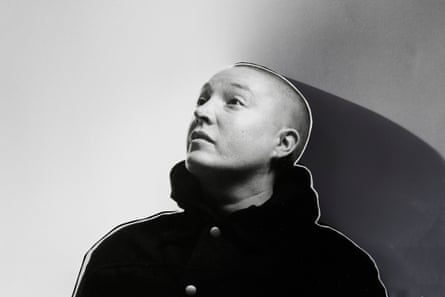
As a child, K Patrick repeatedly tried keeping a journal but impatience with the daily practice meant they’d sit down and start making things up instead. Now 36 and a recent graduate of Glasgow University’s master’s in creative writing programme, former greengrocer Patrick lives on the Isle of Lewis and wrote the bulk of the first draft of Mrs S in just three months.
Its protagonist is a young Australian woman who travels to England to take up a role at an elite girls’ boarding school, where over the course of a torrid summer she embarks on an affair with the headteacher’s wife, the eponymous Mrs S. The intense physicality of the novel’s emotions and its stylish, stripped-back prose make for an arresting pairing as Patrick’s butch protagonist grapples with a nascent trans identity.
“The trans part is harder to write about because I’m still too close to it in a way,” Patrick explains. “You also don’t want to become a spokesperson for something that’s so huge. I’m no expert – I’m trying to figure it all out as well.”
Patrick also writes poetry and picture books and enjoys the distillation of both forms. “Every time you write something, it’s practice,” they say.
How did Mrs S originate?
I didn’t come at it with any lofty themes – I just had this impulse to write a horny lesbian novel. Sapphic literature sometimes has this chasteness to it and I wanted something that felt a bit more true to my experiences. That sexuality can also be expressed in really intense and sudden and electrifying ways – it’s not all long, long letters. That’s why I started using the word “horny” instead of “erotic” – everyone hates it but it does the job.
Is there any character you particularly identify with?
The biggest surprise of all was the housemistress. She wasn’t there at the start and she ended up being my favourite character. That queer mentorship is so crucial to the protagonist and I really enjoyed paying homage to the kind of relationship you don’t read much about. I aspire to be like the housemistress but emotionally I’m more like the protagonist.
When are you most productive?
I do a lot on my phone at four or five in the morning. You can do stuff in the dark, which sounds really creepy but it’s very noncommittal and low-stakes. That’s when I think of the best plot and metaphors, when I’m not trying.
Do you ever get stuck?
There’s a 10,000-word block that seems to happen with me each time. The book will seem so straightforward and then I’ll get to word 9,999 and I’ll be like: “What am I going to say next?” You just have to leave it for a month and then come back to it. That’s the thing that I’ve had to learn most – patience.
What’s the best writing advice you’ve received?
To relentlessly copy out passages that you love.
What have you copied passages from lately?
O Caledonia by Elspeth Barker. It’s so funny and so brutal, which is my favourite combination.
Which authors write sex best for you?
For Mrs S I read James Baldwin, Giovanni’s Room, over and over again. Garth Greenwell is amazing to me and Robert Glück’s Margery Kempe has the best sex writing of all time. HA
Santanu Bhattacharya
One Small Voice (Fig Tree, 23 February)
I felt like there was a place for stories from our parts of the world
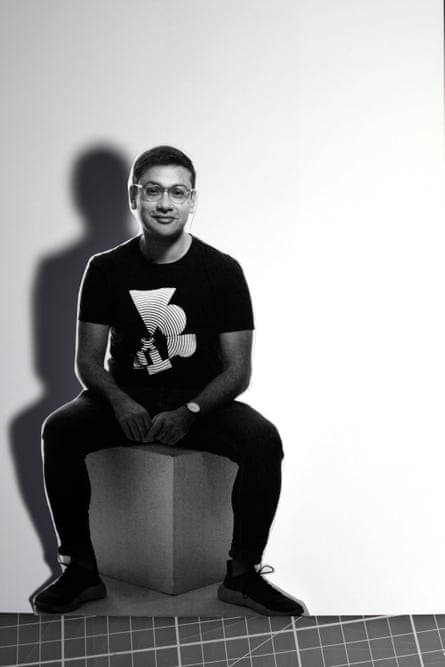
Reading Elena Ferrante’s My Brilliant Friend quartet, Santanu Bhattacharya felt reassured. He had written a number of drafts of his beautiful coming-of-age novel and was encouraged by the Italian author’s cast of characters and their lives. “Because literature in the past few years has gone in a direction that is a little different from what I have [done],” he says, “stories [can be] quite simplistic, short, message heavy.”
One Small Voice, set in modern India, sprawls over three decades and several cities and offers, as author Max Porter puts it, “a whole universe of feeling”. (Bhattacharya was mentored by Porter as part of a prize he won.) The book starts in 1992 and describes an era of rising nationalism and a country ablaze with rioting. Its central character, Shubhankar Trivedi, is a 10-year-old living with his family in the northern city of Lucknow who one day witnesses a horrific act of violence that will change him for ever, shadowing and shaping his messy and traumatic journey to adulthood.
Bhattacharya is 41, grew up in India and moved to the UK seven years ago to do an MA in public policy at Oxford. He now lives in London and works as an education consultant. He has already won several prizes for his writing including, in 2021, the Mo Siewcharran prize and the Life Writing prize.
Your characters are complex and nuanced…
When I started the book I was more interested in the themes, the wider perspective, but as I went along these characters kept growing inside my head. I became so invested in them and I hope that when people read the book they see it as stories about people. Real people. I am always fascinated by authors who write characters that are very stereotypical because it actually takes a lot of effort! It’s the opposite of what you might think – it’s not easy to write stereotypes because that just means you are boxing them in when they’re actually flailing arms and saying “no”. I let the characters take me wherever they were going.
Are you worried about the reaction of people in India to the subject matter?
I was and am nervous about the current administration in India because the book is very critical of them and their ideology and what it is doing to artists and journalists, activists. I am curious to see how it is received. I hope that it gets its space and that it is allowed to be read and no one faces any kind of trouble for supporting it. My family and friends, my publisher. Penguin India. It impacts everyone… bookstores that carry books that are controversial.
Who are your favourite authors?
I was inspired to write when I started reading books in the early 2000s by Mohsin Hamid – Moth Smoke, The Reluctant Fundamentalist – and Khaled Hosseini’s The Kite Runner. In school we had read the classics, mostly by authors who were white and male and writing about subjects that were very alien to us. It was only when I started reading fiction by authors from the south of Asia that I felt like there was a place for stories from our parts of the world and maybe I could write something. These were deeply personal stories against a backdrop of sociopolitical change in these countries. They were my foundational reading.
What is your second novel about?
It’s different. I wanted to look at immigration from a fresh perspective and it’s about a new arrival in the UK. Fortunately this novel has come out a lot more easily, flown out of me! UK
